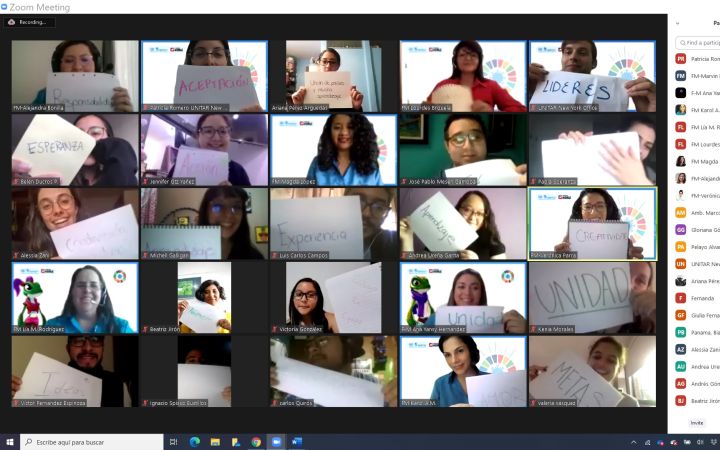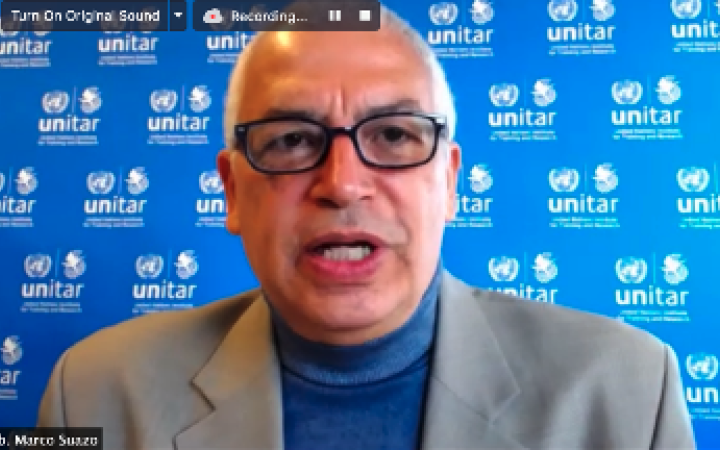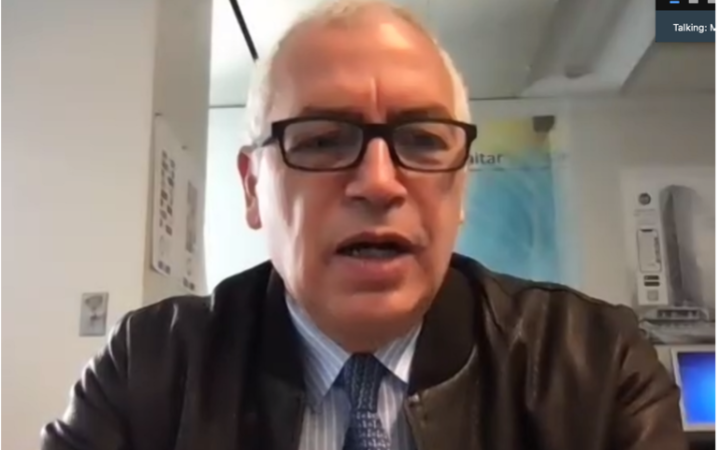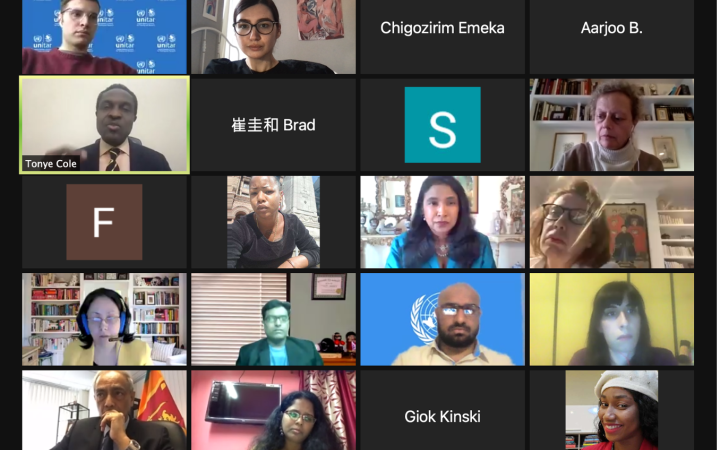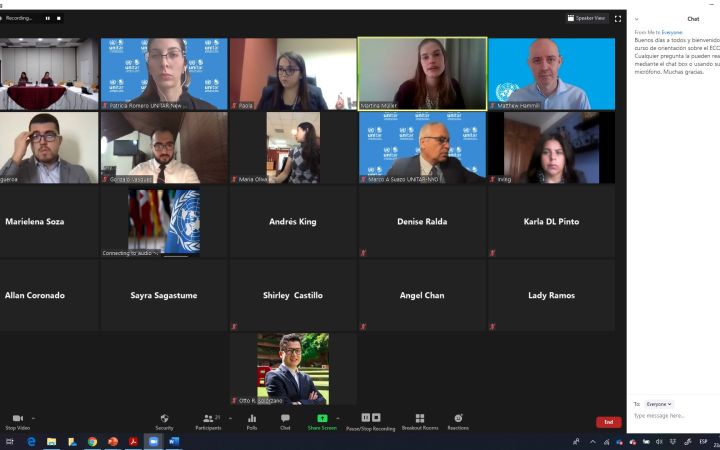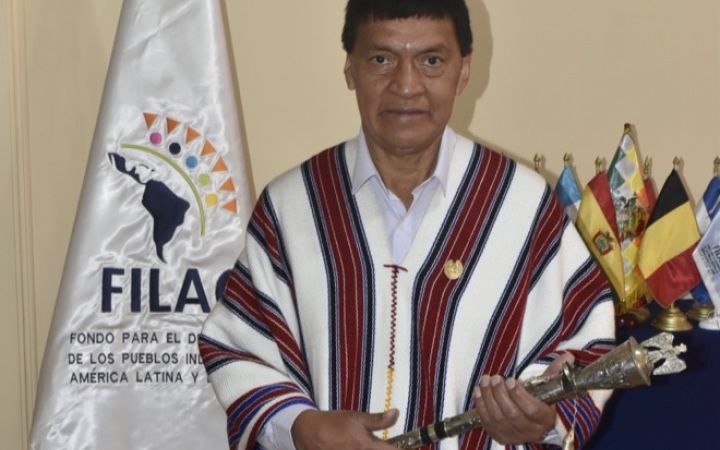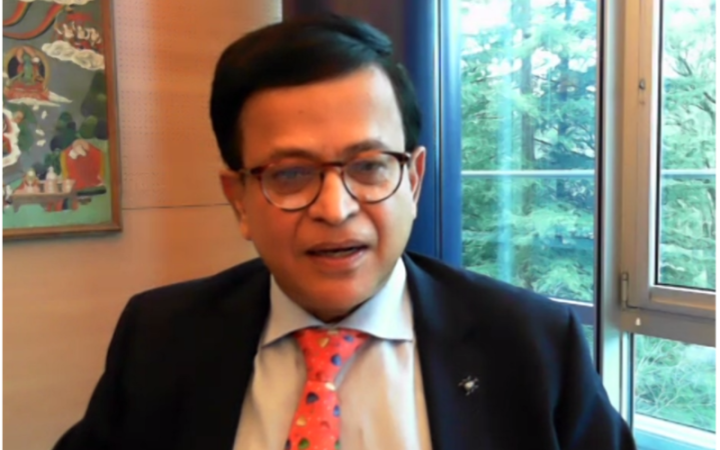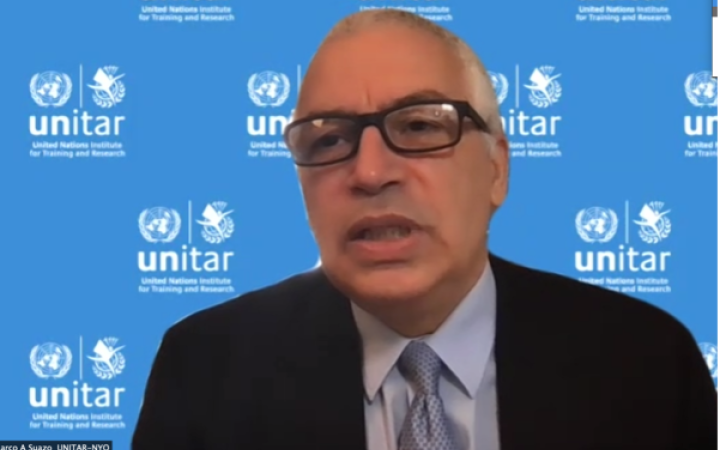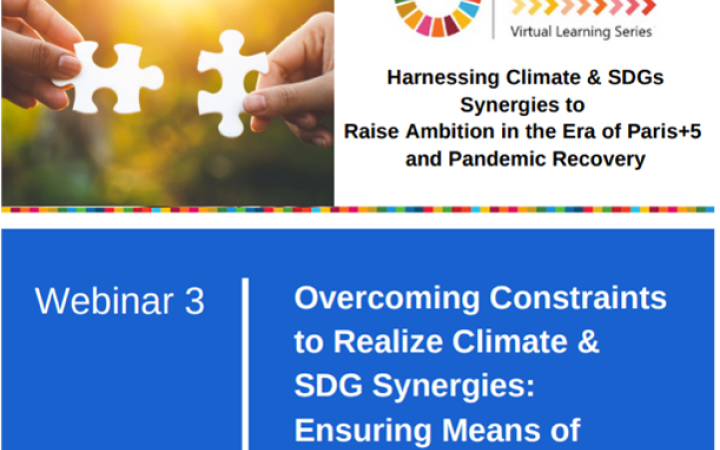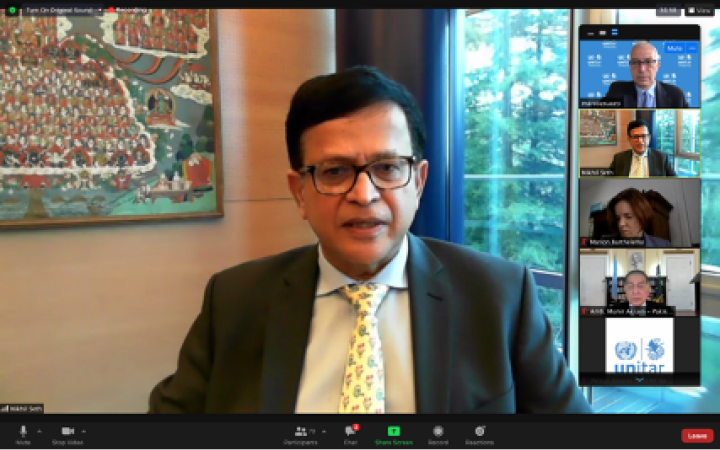Displaying 181 - 190 of 477
6 de abril de 2021, Nueva York, Estados Unidos de América - Los equipos del Instituto de las Naciones Unidas para la Formación e Investigación (UNITAR) en Nueva York y Fundación Monge unieron esfuerzos para desarrollar un taller virtual en el marco del Foro Mundial de la Juventud del ECOSOC 2021 que celebra su 10.° aniversario el 7 y 8 de abril de 2021.
29-30 March 2021, New York, USA (Virtual) – The United Nations Institute for Training and Research (UNITAR) New York office successfully held the “Leaving No One Behind: Validating ALL Voices of Culture” virtual webinar in partnership with the Global Foundation for the Performing Arts (GFPA). This two-day, two session webinar series not only featured a myriad of leaders and advocates in the art and cultural industries, but also marked the second time of successful collaboration between the UNITAR and the GFPA. Since last year, this fruitful partnership has directly benefitted over 190 participants from countries around the world.
15 March 2021, New York, United States (Virtual) – United Nations Institute for Training and Research (UNITAR) New York office concluded the Columbia University Law School Spring Series with its successful third endowment of the ser on conflict resolution for innovative program-solving on Monday 15 March 2021. The online event attracted over 120 participants from different countries around the world and was supported with funding allocated from the Swedish International Development Agency’s (SIDA) contribution to the UNITAR Strategic Framework Fund, under the programme ‘Leveling the Playing Field’ which focuses on the development of skills and knowledge of Least Developing Countries. Participants of the whole series will receive a certificate signed by the Dean of Columbia Law School, Gillian Lester and ASG, Executive Director, Mr. Nikhil Seth.
1 - 4 March 2021, New York, USA (Virtual) - The United Nations Institute for Training and Research (UNITAR) New York Office, in partnership with the University of Pennsylvania Carey Law School, successfully implemented its four-day seminar series entitled “Gender Equality in the International Rights Framework: Building Back Better” from 1-4 March 2021. Over 150 participants joined the session virtually from all over the world during the duration of the series. This series was developed to coincide with the beginning of Women’s History Month and discussed various concerns related to gender equality. This series was supported with funding allocated from the Swedish International Development Agency’s (SIDA) contribution to the UNITAR Strategic Framework Fund, under the programme "Leveling The Playing Field", which focuses on the development of the skills and knowledge of Least Developing Countries.
23 February 2021, New York, USA and Guatemala City, Guatemala – The United Nations Institute for Training and Research New York Office (UNITAR NYO) hosted a course on the work of the ECOSOC, entitled “UNITAR Orientation Course of the ECOSOC for Guatemala Delegates” on 23 February 2021. As with the previous course held in January, this training took place in an online format, attracting over 20 delegates that participated from the Ministry of Foreign Affairs and the Permanent Mission of Guatemala in New York. The UNITAR New York office delivered a three-session online training to diplomats mostly working within the human rights, multilateral policy, international policy and cooperation fields, under the auspices of the Sweden programme entitled “Leveling the Playing Field”.
12 February 2021, New York, USA - Head of UNITAR New York Office, Mr. Marco Suazo, attends the Transfer of Power Ceremony for the newly elected Technical Secretary for the Development of the Indigenous People’s Villages of Latin America and the Caribbean. After receiving a personal invitation from the President of the Directive Council, Mirna Cunningham, UNITAR New York Office Head of office Marco Suazo, attends the ceremonial proceedings. After a brief spiritual introduction, Segundina Flores, member of the Directive Council of FILAC, gave welcoming remarks on behalf of the Native People’s Villages of Bolivia. Once finished, the floor was then passed to Freddy Mamani, Vice counselor of the Multinational State of Bolivia, host of FILAC, where welcoming remarks were also continued by him. Passing the floor then to Amadeo Martinez, Forum Coordinator of Indigenous People of Abya Yala, Amadeo proceeded to speak shortly concerning the aspirations of the Indigenous Villages of Latin America for the new leadership. In full support of the new State’s initiatives that are to be a part of FILAC, Fernando Aguirre, Representative of Colombia voiced his adamant endorsement of the proposed initiatives for the new term. Reaffirming the responsibilities and promises made to the Indigenous Villages was noted to be of prime importance by Higinio Obispo, ONIC. The renewed willingness to support extra-regional states was highlighted by Carmen Castiella in the next session, Vice President of FILAC for the Government of Spain.
10 February 2021, New York, USA (Virtual) – The United Nations Institute for Training and Research New York Office (NYO) successfully concluded the two-day virtual seminar entitled “Induction Course for the Members of the United Nations Peacebuilding Commission. The ambassadorial-level session of the Induction Course for the Members of the United Nations Peacebuilding Commission 2021was attended by over 80 participants and provided the opportunity to discuss priorities.
H.E. Mr. Marco Suazo, UNITAR NYO Head of Office, opened the session by thanking all participants for their attendance and additionally spoke about the goals of the Commission, especially considering the COVID-19 pandemic. Mr. Nikhil Seth, Assistant Secretary-General and Executive Director of UNITAR, followed Mr. Suazo with introductory remarks on the importance of the Commission, including his own experience in it.
H.E. Mr. Marco Suazo, UNITAR NYO Head of Office, opened the session by thanking all participants for their attendance and additionally spoke about the goals of the Commission, especially considering the COVID-19 pandemic. Mr. Nikhil Seth, Assistant Secretary-General and Executive Director of UNITAR, followed Mr. Suazo with introductory remarks on the importance of the Commission, including his own experience in it.
9 February 2021, New York, USA -
The United Nations Institute for Training and Research New York Office (UNITAR NYO) and the Peacebuilding Commission Office (PBC) hosted the first day of the Induction Course for the Members of The United Nations Peacebuilding Commission on 9 February 2021. It took place in an online format, attracting over 75 delegates.
The United Nations Institute for Training and Research New York Office (UNITAR NYO) and the Peacebuilding Commission Office (PBC) hosted the first day of the Induction Course for the Members of The United Nations Peacebuilding Commission on 9 February 2021. It took place in an online format, attracting over 75 delegates.
3 February 2021, New York, USA (Virtual) – The United Nations Institute for Training and Research (UNITAR) New York office announced the launching of “Harnessing Climate & SDG Synergies to Raise Ambition in the Era of Paris+5 and Pandemic Recovery” an online course series in collaboration with the United Nations Department of Economic and Social Affairs (UNDESA) and United Nations framework Convention on Climate Change (UNFCC).
26-27 January 2021, New York, USA (Virtual) – The United Nations Institute for Training and Research New York Office (UNITAR) kicked off the new year with a three-day orientation course on the Economic and Social Council for members of the council on Tuesday, 26 January 2021. The first session was delivered virtually with over 100 delegates participated, from different parts of the world The training was supported with funding allocated from the Swedish International Development Agency’s (SIDA) contribution to the UNITAR Strategic Framework Fund, under the programme ‘Leveling The Playing Field’ which focuses on the development of skills and knowledge of Least Developing Countries.


